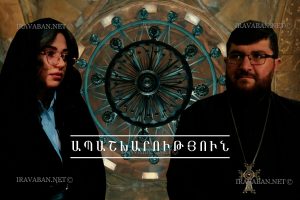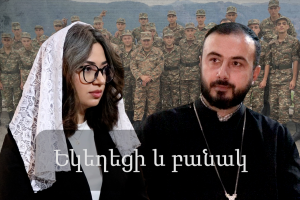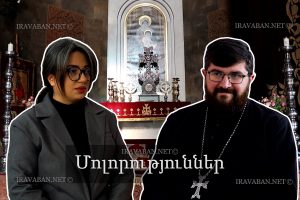As part of the “Church and Law” interview series, Iravaban.net discussed the topic “Defamation and Hate Speech: The Church’s Position and Role in Modern Society” with Father Sahak Sahakyan, spiritual pastor of the Kecharis Monastery Complex in the Kotayk Diocese.
-How does the church define defamation and why is it considered a sin in Christian doctrine? Are there cases when revealing the truth might be mistakenly perceived as defamation?
-Defamation is directly connected with lying. Defamation implies that there is an accusation that doesn’t correspond to reality, and since we’re dealing with lies, the Gospel clearly states who is the father of lies. Jesus says Satan is the father of lies. The defamer indirectly connects themselves with the father of lies, therefore defamation can never be justified. Defamation is not only connected with lying, it implies a lie intended to cause harm. At the foundation of defamation lies falsehood that aims to kill – we don’t necessarily mean physical killing, there is also killing in the spiritual sense. Defamation contains an element of spiritual homicide. Defamation is the distortion of truth. The defamer clearly knows they are defaming and clearly knows their desire to harm.
-The 9th Commandment says “Do not bear false witness against your neighbor.” How is this commandment applied in the modern world, especially in the context of social media?
-The changes in our lives have led to situations that were once attributed to those in high social positions now affecting much broader segments of society. In the past, people were mainly occupied with their work and didn’t engage in such mental exercises at work, but because social platforms now create opportunities for various mental exercises, the audience for false testimonies and defamation is much wider than before. In the past, such processes occurred during court intrigues, but today broad segments of society are involved in all this. The Biblical commandment speaks directly about this. Punishment is established for bearing false witness: The false witness should be punished with the same punishment they intended for the person accused through their testimony. This is also called the law of reciprocity – an eye for an eye. If the defamer, the false witness wishes death upon someone who hasn’t committed the act, then upon discovery, they should be subject to capital punishment.
-Along with the emergence of social media, hate speech and defamation have become more widespread. What methods does the church use to combat this?
-Broadly speaking, the church has no leverage to fight this – I’m speaking from a legal perspective – that’s the state’s function to find solutions and apply appropriate mechanisms. Today, the church only has the leverage of preaching, preaching and reminding people that any defamation, any sin carries its weight. When someone defames, tarnishes a good reputation, they might avoid the earthly judge, but the case will come before the impartial judge – God, who needs no witnesses or confession. Retribution will come.
-Who are the defamers, can a true follower of the Armenian Apostolic Holy Church who truly knows God defame? Who defames?
-No one is immune from such sins, just as they aren’t immune from all their sins. A Christian isn’t someone who doesn’t sin, a Christian is someone who, even when in sin, realizes it and tries to stand up. That’s the difference from someone who has no remorse. We all encounter lies.
-Where is the boundary between fair criticism and defamation?
-Fair criticism implies truth and implies there is no intention to harm the other person. If criticism is fair, the purpose is good, the criticism is constructive. Defamation only relates to destruction; if the purpose isn’t destruction, our criticism can be useful. There’s another difference: criticism is open, the critic presents themselves, while the defamer doesn’t reveal themselves, hides themselves, because their work is darkness.
-The Bible says we should pray for everyone, including authorities. How does the church interpret the connection between prayer and tolerance with social peace, especially in tense political situations?
-The church always prays for everyone, including current authorities, soldiers, the sick, the needy, even evildoers. But the church has one mission, which is not to justify sin. Tolerance is shown not toward the sin but toward the sinner. The church doesn’t justify the sin, it justifies the sinner. If the sinner accepts the church’s call, the priest’s call to repent and takes a step, the church never closes its doors to that person. And always waits for every sinner’s return. There are those who cut the bridges themselves. There were times when in such cases the church would declare heresy and state that this person or group had cut themselves off from the church. The church can do nothing but invite; when they decide they must return, the church will welcome them with open arms.
Details in the video




























